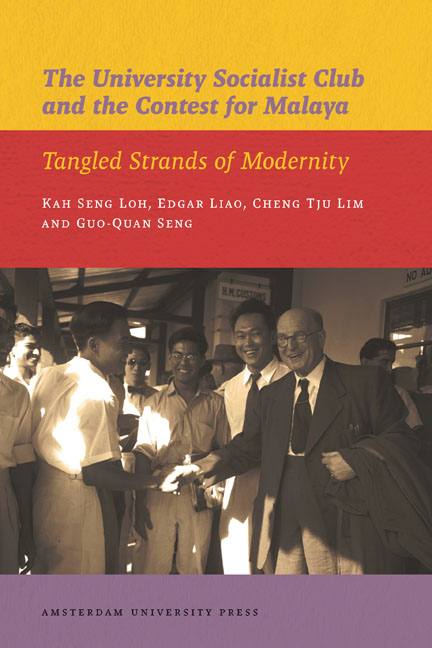Book contents
- Frontmatter
- Dedication
- Contents
- Acknowledgments
- List of Photographs
- Abbreviations
- 1 The Socialist Club and the Modernity Project
- 2 Awake in the Bowl of Night
- 3 The Fajar Trial
- 4 Visionary of the Nation, Voice of Stifled Malayans
- 5 A Beacon of Light on the Campus and Beyond
- 6 Frankly Partisan in the Struggle for Student Leadership
- 7 The Shadow over the Club
- 8 Resisting Malaysia, Swansong for Malaya
- 9 Long Night after Coldstore
- 10 In Defence of University Autonomy and Student Rights
- 11 Entwined Memories and Myths
- Conclusion: Modernity in Singapore and Malaya Reconsidered
- The University Socialists: Biographical Sketches
- Timeline of Events
- Notes
- Bibliography
- Index
- Publications Series
5 - A Beacon of Light on the Campus and Beyond
Published online by Cambridge University Press: 21 January 2021
- Frontmatter
- Dedication
- Contents
- Acknowledgments
- List of Photographs
- Abbreviations
- 1 The Socialist Club and the Modernity Project
- 2 Awake in the Bowl of Night
- 3 The Fajar Trial
- 4 Visionary of the Nation, Voice of Stifled Malayans
- 5 A Beacon of Light on the Campus and Beyond
- 6 Frankly Partisan in the Struggle for Student Leadership
- 7 The Shadow over the Club
- 8 Resisting Malaysia, Swansong for Malaya
- 9 Long Night after Coldstore
- 10 In Defence of University Autonomy and Student Rights
- 11 Entwined Memories and Myths
- Conclusion: Modernity in Singapore and Malaya Reconsidered
- The University Socialists: Biographical Sketches
- Timeline of Events
- Notes
- Bibliography
- Index
- Publications Series
Summary
The University of Malaya campus in the 1950s and early 1960s was a miniature world where opposing visions of a new Malaya were articulated and contested. In attempting to mobilise the students, the Socialist Club encountered much conflict but also achieved some degree of success. This chapter focuses on its attempts at collaboration with other student leaders. The University Socialists were not the only leaders and activists within the student community, but they were often the most vocal and passionate. They won for themselves, their club and their causes due attention, if not always respect and support. As student activists, some endeavoured to galvanise and unite the various student groups in Malaya and Singapore behind their cause. The results were mixed, succeeding momentously but momentarily with the formation of the Pan-Malayan Student Federation (PMSF) in the 1950s, but the Federation and the Club's other efforts soon ran into many obstacles.
The Club's campus activism was a logical extension of its aims to “stimulate political discussion and activity” and “propagate socialist thinking” within the University, in pursuit of an independent socialist Malaya inclusive of Singapore. One way was to organise discussion groups, forums and talks on the campus. The Club was not the only student society to hold talks and debates on political issues. In 1955, for example, the Historical Society organised a forum on “The Political Future of Malaya”. Among the invited speakers was Mrs Elizabeth Comber, better known as Han Suyin, the internationally known leftist intellectual and writer who was also a frequent guest speaker at the Club's talks. The Socialist Club's events, however, were usually the most prominent and the best attended, as they enjoyed the patronage of prominent politicians, intellectuals and personalities at the time, especially up to 1961. These platforms helped bridge the students and other intellectuals and political figures outside the campus, in particular the members of the newly-formed People's Action Party. For instance, its programme for June 1960, at a critical juncture in Singapore's history, featured talks by Club alumni James Puthucheary on “Socialism Yesterday and Today”; Sydney Woodhull on “Whither the Trade Union”; Alex Josey on “The Democratic Experiment in Asia”; and Gerald de Cruz on “The Philosophy of Socialism, Democratic Socialism and Communism”.
- Type
- Chapter
- Information
- The University Socialist Club and the Contest for MalayaTangled Strands of Modernity, pp. 105 - 126Publisher: Amsterdam University PressPrint publication year: 2012

